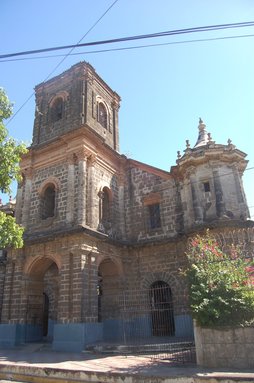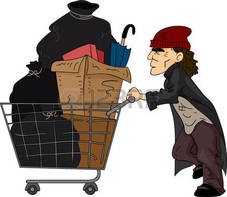
A one-legged amputee, the old man sits on the ground leaning beside his wheelchair and against the black wrought iron fence that borders the church in our neighbourhood of Zaragoza. One day he is not there, the next day he is.
We regularly walk seven blocks to centro for shopping, banking, park concerts in León, Nicaragua, where we are living for three months; the Zaragoza Church is enroute. So the old man’s appearance is sudden and surprising. During our first pass, I glance surreptitiously at him. A small bundle of belongings is heaped on the seat of his wheelchair. Loose plastic grocery bags containing mysterious items are scattered around him. It is morning, no shade on this side of the church. He wears no hat although the sun beats mercilessly down on him. Coupled with 30 C (90 F) plus degree temperatures, he has to feel uncomfortable even if he is Nicaraguan. As a visitor I know I suffer from the heat, sweating profusely while seated on a bench in the shade.

But no. We are alarmed he is still there the next day, and the next day, and the next….each time we pass, he is there. We also notice scraps of food around him. We deduce people feed him, including us. Each time we return from grocery shopping at the supermercado, we drop something off at his feet if he is dozing or in his lap if he is awake. First, it is a mandarino, then a boxed fruit drink, and soon a small snack of fruit, chicken pastry, and a drink. Initially he says nothing, eyes constantly closed as if waiting for death. Later he appears more alert and we hear gracias, once I heard ‘thank you’.
Six weeks later and the old man is still here. His sidewalk space outside the church is expanding. Someone has dropped off a large cardboard box, perhaps for shelter from the sun. Numerous pieces of food lie sprinkled around him. His position is the same since he parked himself there.
We figure someone must look after his personal needs. Although my husband says he smells a strong odour of urine in his vicinity, we note the old man’s gray hair and matching beard is cut and groomed. His face is weathered, sun damaged.
Earlier we had asked about the old man with a neighbouring Nicaraguan, a friend fluent in English. He says there are many people like the old man. He says authorities want to place these people somewhere else, out of the line of vision of visitors. City Fathers do not want tourists to see the visible poor who lie prostrate in door wells, unfortunates wasted by illegal drugs, civil war cast-offs from decades ago still suffering post traumatic stress disorders. These ugly sights are not for the tourist who comes to Nicaragua for a good time: sun, sea, volcano boarding, eco cloud forest trekking, all for much cheaper rates than neighbouring Costa Rica.
On our return to our casa from the supermercado, prepared to drop off his usual fare, we discover the old man’s wheelchair has disappeared; the sidewalk is clean, no sign of habitation or garbage. No odours. Out of sight, out of mind.
An unwanted liability, the old man is gone.
 RSS Feed
RSS Feed